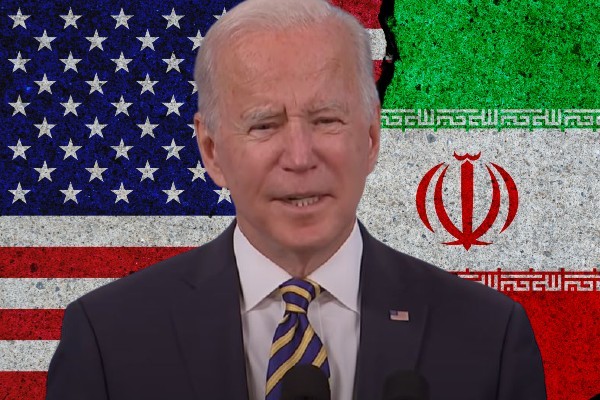How could the Biden administration keep the American people and allies such as Israel in the dark when the Iran’s ruling mullahs have made it clear that a top priority is to attack the US and eradicate the Jewish state?
By Majid Rafizadeh, Gatestone Institute
The Biden administration has been accused of secretly bypassing US laws to reach a deal with Iran’s Islamist regime.
On August 10, the Biden administration apparently cut a “deal” excluding Congress and keeping the American people and U.S. regional allies in the dark — even though they are the ones who would be the most directly affected by a “deal.”
The Biden administration, determined, it seems, to continue appeasing the Iranian regime — called by the US State Department the leading state sponsor of terrorism — keeps indefatigably trying to revive then President Barack Obama’s 2015 “nuclear deal,” enabling Iran’s mullahs legitimately to have as many nuclear weapons as they like.
Evading Congressional oversight, the Biden administration reached a deal in which the United States agreed to pay $6 billion dollars and release a handful of Iranian nationals who are serving prison sentences in the US, in exchange for the release of five Iranian-Americans imprisoned in Iran. The sum comes to more than a billion dollars per head — possibly largest hostage ransom payment in America’s history — and that makes every American on foreign soil a juicy mark.
The Biden administration’s “deal,” cut behind closed doors, not only excluded Congress; it also seems to have “zero benefit” for the United States and keeps the American people and U.S. regional allies in the dark — even though they would be the most directly affected by a “deal.”
House Majority Leader Steve Scalise, GOP Conference Chair Elise Stefanik and House Foreign Affairs Committee Chairman Michael McCaul accused President Joe Biden on August 21 of breaking a 2015 law, the Iran Nuclear Agreement Review Act (INARA) by secretly negotiating and reaching a nuclear “understanding” with the Iranian regime alongside a hostage release deal.
“Taken together,” they wrote, “this strongly suggests your Administration has contemporaneously brokered a $6 billion prisoner deal and a nuclear understanding with the regime that are inextricably linked.”
On August 15, US Rep. Michael McCaul, chairman of the House Foreign Affairs Committee, also wrote Biden a letter warning him about the congressional review required of any nuclear deal with the regime of Iran:
“I urge the Administration to remember that U.S. law requires that any agreement, arrangement, or understanding with Iran needs to be submitted to Congress pursuant to INARA.”
McCaul, in addition, posted a tweet, stating:
“If President Biden finalized a nuclear understanding w/ Iran simultaneously with a $6B hostage deal, continuing to keep Congress in the dark violates US law. @SteveScalise, @RepStefanik, and I will use all tools at our disposal to bring transparency & accountability to Americans.”
INARA directs the White House to inform the Congress of any negotiations that are linked to Iran’s nuclear program, and any agreement must be approved by Congress. The president is required:
“… within five days after reaching an agreement with Iran regarding Iran’s nuclear program, to transmit to Congress: the text of the agreement and all related materials and annexes; a related verification assessment report of the Secretary of State; a certification that the agreement includes the appropriate terms, conditions, and duration of the agreement’s requirements concerning Iran’s nuclear activities, and provisions describing any sanctions to be waived, suspended, or otherwise reduced by the United States and any other nation or entity, including the United Nations”.
“That the White House announced this deal during the August congressional recess was no coincidence,” wrote former White House Security official Richard Goldberg on August 15.
“Emergency hearings cannot be held. Resolutions of disapproval cannot be fast-tracked. President Biden has successfully evaded the Iran Nuclear Agreement Review Act, which requires him to notify Congress of any agreement with Iran related to its nuclear program before lifting sanctions.”
More alarmingly, more billions apparently await the mullahs. According to Goldberg:
“At least $16 billion has now been made available to Iran without any congressional input—and more might be on the way. Another $6.7 billion is reportedly moving to Iran via the International Monetary Fund Special Drawing Rights… and reportedly … another $3 billion of regime assets frozen in Tokyo. India and China….”
How could the Biden administration keep the American people and allies such as Israel in the dark when the Iran’s ruling mullahs have made it clear that a top priority is to attack the US, eradicate the Jewish state and “wipe Israel off the map”?
Iranian President Ebrahim Raisi, known as the “butcher of Tehran” after being involved in the 1988 massacre of nearly 30,000 political prisoners, has openly called for the destruction of Israel:
“This great movement that we are witnessing today in the form of protests is a symbol of the solidarity of the Muslim people that will lead to the destruction of the Zionist regime.”
When it comes to the U.S., the Iranian regime has plenty of blood on its hands. The regime was involved in 9/11, for which a U.S. federal court ordered Iran to pay $7.5 billion to the victims’ families; the 1983 bombing in Lebanon of the U.S. Marines barracks, in which 241 Marines were killed; the 1984 United States Embassy Annex bombing in Beirut, and the bombing of the USS Cole.
The Biden administration’s endless preference for the openly-expansionist, terrorist-supporting, citizen-murdering regime of Iran directly puts US national security, the lives of our allies worldwide, and the lives of American people at risk.
Dr. Majid Rafizadeh is a business strategist and advisor, Harvard-educated scholar, political scientist, board member of Harvard International Review, and president of the International American Council on the Middle East. He has authored several books on Islam and US foreign policy. He can be reached at Dr.Rafizadeh@Post.Harvard.Edu
